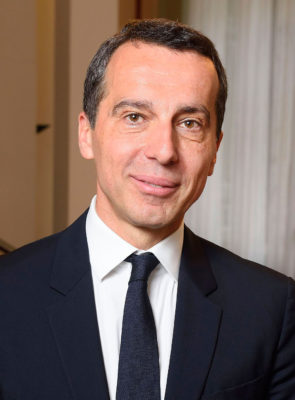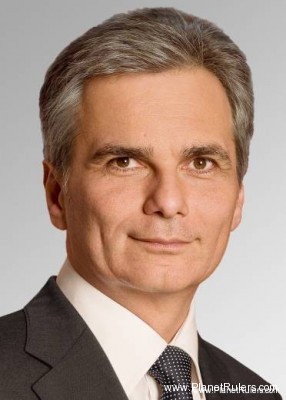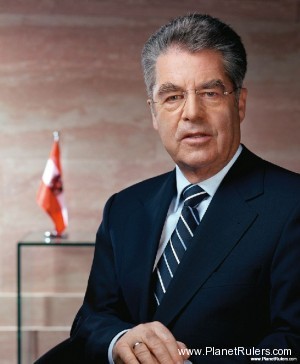Karl Nehammer, Chancellor of Austria (since Dec 6, 2021)

Nehammer grew up in Vienna, where he attended Kalksburg College and Amerlingstrasse Grammar School, graduating in 1992. He completed his military service as a one-year volunteer with further service until 1996. In 1997 he was discharged as a lieutenant. He then worked as an instructional trainer for information officers for the Federal Ministry for National Defence and as a trainer for strategic communication for various institutions such as the Vocational Promotion Institute (BFI) and the Political Academy of the Austrian People’s Party. From 2012, he completed a two-year university course in political communication at the University for Continuing Education Krems and graduated with a master’s degree.
Nehammer is a member of the Catholic Austrian Students’ Corporations Sonnberg Perchtoldsdorf within the Mittelschüler-Kartellverband. He is married to fellow ÖVP member Katharina Nehammer. They have two children. The couple received criticism in early 2020 after Katharina was appointed spokeswoman for the Ministry of Defence, with Herbert Kickl accusing the government of putting interior and defence policy “in the hands of one family”. She began working in the private sector in public relations in July 2020. Nehammer’s father-in-law is former ORF presenter Peter Nidetzky.
Source: https://en.wikipedia.org/wiki/Karl_Nehammer
Christian Kern, Former Chancellor of Austria

A business journalist by profession, the member of Austria’s Social Democratic Party served as spokesman of the SPÖ’s parliamentary group leader in the mid-1990s, before he became a senior manager in Austria’s leading electricity company Verbund AG. In 2010, Kern was appointed CEO of the state-owned Austrian Federal Railways (ÖBB), chairing the Community of European Railway and Infrastructure Companies (CER) from 2014 onwards. Following the resignation of Werner Faymann amidst the Austrian presidential election, the governing Social Democrats nominated Kern for the country’s highest executive office.
Kern was sworn in as Chancellor of Austria on 17 May 2016, vowing to continue the “Grand coalition” with Austrian People’s Party (ÖVP), but promising a “New Deal” that would bring about more jobs by cutting red tape while ensuring ordinary workers receive a share of economic prosperity. Kern criticized the Austrian political elite as being power-obsessed and devoid of a meaningful political agenda about the country’s future.
In 1985 Kern married Karin Wessely, with whom he has three sons. In 2001, his marriage with Wessely, who is a local SPÖ politician in Mödling, a district capital south of Vienna, ended in divorce. Wessely however supported his nomination as successor to Faymann, and highly praised him as a charismatic personality, who is able to unite the more left-aligned and the more right-aligned factions of their party.[20] With his second wife, Eveline Steinberger, he has a daughter.
Source: https://en.wikipedia.org/wiki/Christian_Kern
Werner Faymann, Former Chancellor of Austria
On 2nd December 2008 Werner Faymann, the executive chairman of the Social Democratic Party of Austria (SPÖ), was sworn in by Federal President Heinz Fischer as Federal Chancellor.
Werner Faymann was born 4 May 1960 in Vienna (Austria). He is married and has two children.
Occupational career
1985 – 1988 consultant at the Zentralsparkasse,
1988 director and provincial chairman of the Viennese Tenants’ counselling.
Political career
1985 – 1994 provincial chairman of Socialistic Youth Vienna (Sozialistische Jugend Wien),
1994 – 2007 member of the Viennese state parliament and municipal council; executive city councillor for housing, housing construction and urban renewal; president of the Viennese Fund for Provision of Property and Urban Renewal (Wiener Bodenbereitstellungs- und Stadterneuerungsfonds: WBSF) and vice president of the Viennese Business Agency (Wiener Wirtschaftsförderungsfonds: WWFF).
2007 – 2nd December 2008 – Federal Minister for Transport, Innovation and Technology (BMVIT)
since June 2008 – executive chairman of the Social Democratic Party of Austria (SPÖ)
since 2nd December 2008 – Federal Chancellor of Austria
Source: http://www.bka.gv.at
Heinz Fischer (born 9 October 1938) is the Federal President of Austria. He took office on 8 July 2004.
Born in Graz, Styria, Fischer received a humanistic education, taking his “Matura” exams in 1956. He then studied law at the University of Vienna, earning a doctorate in 1961. Apart from being a politician, Fischer also pursued an academic career, and became a Professor of Political Science at the University of Innsbruck in 1993.
Fischer was a member of the Austrian parliament (Nationalrat) from 1971 and served as one of its presiding officers from 1990 till 2004. From 1983 to 1987 he was Minister for Science in a coalition government headed by Fred Sinowatz.
In January 2004 Fischer announced that he would run for President to succeed Thomas Klestil. He was elected on 25 April 2004 as the candidate of the opposition Social Democratic Party of Austria (SP). He polled 52.4 per cent of the vote to defeat Benita Ferrero-Waldner, then Foreign Minister in the ruling conservative coalition led by the Austrian People’s Party (VP).
Fischer was sworn in on 8 July 2004 and took over the office from the presidents of the parliament, who had acted for the president following Klestil’s death on 6 July. Since he was elected President, he has gained more and more favour and is today, according to many surveys, the most popular and trusted Austrian politician.
Apart from labelling him, in a slightly derogatory fashion, as a Berufspolitiker (“professional politician”) who allegedly has never been in touch with the real world, Fischer’s critics, first and foremost his colleague at university, Norbert Leser, point out that Fischer has always avoided controversy and conflict, even when that would have been called for. The example frequently quoted in this context is Fischer’s tacit support of Bruno Kreisky’s attacks on Simon Wiesenthal. On being nominated for Federal President, Fischer himself said that he hated antagonising people and that he considered this quality an asset rather than anything else.
Fischer, who calls himself an agnostic, has been married since 1968. The couple have two grown-up children. Fischer enjoys mountaineering and has been president of the Austrian Naturefriends for many years.



